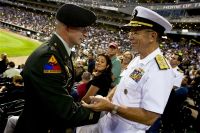CHICAGO — At last night’s Major League Baseball game between the Chicago White Sox and the Baltimore Orioles here, the chairman of the Joint Chiefs of staff couldn’t help but notice the difference between the nation’s support for today’s servicemembers and veterans and the reception returning servicemembers received when they came home from Vietnam early in his military career.
Navy Adm. Mike Mullen threw out the ceremonial first pitch before the game and he also helped the host White Sox honor soldiers from a local Army Reserve unit.
Forty years ago, at the height of the Vietnam War, America didn’t support its troops, Mullen said. There was no tickertape parade when they returned from battle, and stories of Vietnam veterans being ridiculed in the streets by protestors were all too common.
The tension was so bad, Mullen said, that some servicemembers were even ashamed to wear their uniforms. Mullen witnessed such displays first hand, he noted, saying that’s just the way things were when he began his career in 1968.
Mullen, a Vietnam War veteran, has spent the past three years overseeing the war efforts in Afghanistan and Iraq. When the wars kicked off in 2001 and 2003, respectively, he said, one of his initial fears was that the American people might not support the troops.
“As someone who grew up [during the Vietnam War] and saw a complete disconnect between our men and women in uniform and the American people, [the level of support] was a huge concern for me when these wars started,” he said. “It was terrible during Vietnam. It was really bad how troops were treated.”
But today, military members and their families are well supported, he noted. Though many do not support the wars, the American public has never lost sight of the current generation of servicemembers and their sacrifices, the chairman said.
Some 1 million troops have served in Iraq or Afghanistan or both. More than 5,500 have given their lives. Tens of thousands suffer from visible wounds or from invisible wounds such as post-traumatic stress or other psychological injuries.
Mullen often tells troops and civilians during his travels that every troop who deploys to combat potentially has some sort of psychological war wound. People are concerned, he said, and Americans want to reach out and make a difference in the lives of troops and veterans.
Chicago was the first stop for Mullen on a three-day “Conversation with the Country” tour across the Midwest. The trip is geared toward helping community leaders, business leaders and academics realize the talents today’s veterans have to offer as they integrate into the civilian work force and education systems.
“I have found that the American people throughout the country are anxious to help support these men and women,” he said. “Trying to make that connection between those of us who depend on and lead these precious people and the sea of good will out there is what this is all about.”
Mullen has worked to help hundreds of civic and business leaders and outreach groups across the nation — on this trip and others – to gain a better understanding of veterans in their communities.
“There’s a level of knowledge about what we’re going through, about the challenge we have,” said the chairman explained. “I want to make sure that information is out there, and that there is a way for us as leaders inside the military to connect with leaders throughout the country to make sure we can take care of these people.”
Mullen noted the ovation the Army Reserve soldiers received during the game. The cheers from thousands of fans at U.S. Cellular Field were humbling, the troops said. Children ran and pointed to them and to uniformed members of Mullen’s traveling party.
The servicemembers even had their own cheering section. One mother commented that her young son seemed more excited to see “you guys in uniform that the ball players.” “The morale boost servicemembers get from this is great,” Mullen said. “Just knowing that people care about them makes a huge difference.”
Source:
U.S. Department of Defense
Office of the Assistant Secretary of Defense (Public Affairs)

 von
von 